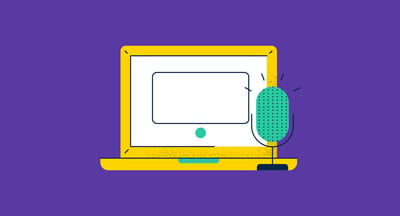October 28, 2024
 by Derek Doeing / October 28, 2024
by Derek Doeing / October 28, 2024

You’ve just landed a phone interview—congratulations!
But now comes the real challenge: how to stand out when the only tool you have is your voice. If you want to ace this critical step in the hiring process, you’re in the right place.
A phone interview (sometimes called a phone screen) is an important first step in the hiring journey. Recruiters and hiring managers use phone screening to ensure candidates meet the minimum requirements of a position before progressing to the next stage. Whether you applied directly or through popular job sites, this is your moment to make a strong impression. The good news? While you may not have the advantage of body language, you can still prepare notes to keep handy.
In this guide, we’ll walk you through common phone interview questions and offer expert tips on how to answer them confidently, ensuring you make a great impression and advance to the next round. Let’s dive in!
These common interview questions can be expected in a phone interview, but if you want to really prepare, continue reading for sample answers that can be used to formulate and prepare your own responses.
As you prepare for these interview questions, it’s important to try to give an accurate and articulated response that also comes across naturally. Use these examples as inspiration for forming your own answers during a phone interview.
This may not be a question, per se, but it is something you should completely expect to answer regardless. Likely to be one of the first items of business during a phone interview, this question provides the interviewer with context as to who you are and validates what you’ve stated in your application and resume. Answering this question naturally and confidently can help set a more relaxed tone for the interview and start things off on a positive note.
Example answer: “Of course. I’m originally from rural Illinois, a small town on the outskirts of Chicago. I received my bachelor’s from Iowa State University, where I studied agriculture communication, and I was able to combine my passion for the agriculture industry with my love for digital media.
I had a previous internship as a content creator for a start-up agriculture media company, as well as a part-time job on campus as a peer writing tutor. Upon graduating, I sought out positions in marketing for start-ups in the technology sector.
I wanted to expand my experience beyond the world of agriculture, and technology marketing is at the forefront, so I believed that’s where I could learn the most.
I’m currently a content marketer for XX, where I am involved in creating written content and participating in the current SEO strategy in order to fulfill top-of-funnel marketing objectives. I’ve truly learned a lot throughout my experience and aim to continue learning throughout the course of my career.”
A question like this is fairly straightforward. Explain simply what sourced you to the position, whether that be a recruiter, an employee referral, a job board, a public listing, or some other origin. This can be an opportunity to share what drew you to the position or company in the first place.
Example answer: “I found this position in a listing on Built-In Chicago and was really drawn to the company culture as well as the opportunity to expand my skill set into a new industry. I felt as if the job description really spoke to me.”
If you’ve made it to the phone interview stage, it’s time to do further research into the company beyond the role you applied for. The interviewer is trying to ensure you are aware of what the company does and how you can help its overall mission. This is a great place to mention something about the company’s values or culture that you feel you can relate to. Having the company’s website up for reference during this time can be incredibly helpful.
Example answer: “When applying to this position, I looked into G2’s mission to help users and businesses reach their potential. I think the fact that you’re providing a platform for people to share their experiences about their software with each other and the companies that produce them can help bring transparency through the marketplace. On top of that, the start-up culture and values I read about are all things I can see myself being a part of and ultimately contributing to.”
Similarly to your research into the company, you should make sure to do research into the position you’re applying to. Draw connections between your past experiences and the job description itself to showcase exactly why you want the job.
Example answer: “Being able to work collaboratively with other content creators as well as pick up skills within an industry on the leading edge of innovative marketing practices really drew me in. I think with my experience in content creation and my knowledge of writing and research. I could really assist your team in developing pieces to drive traffic.”
This question is designed to relate your current role to the position you are applying for. Again, connect your experience and the job description to show how your abilities and skills can be relevant to the role you hope to gain.
Example answer: “As a Content Marketing Associate, I currently spend quite a bit of my time involved in content strategy, outreach, and distribution, as well as topic and keyword research. Mostly, I create written content for the company blog, aimed at bringing visitors to our website and eventually introducing them to the service we provide.”
This question is often asked to understand the motivations behind your job change. Employers want to make sure you’re leaving for the right reasons—whether that’s for growth, new challenges, or aligning with your long-term career goals—rather than because of negative reasons like conflict or dissatisfaction with your current employer.
Example answer: "I've learned a lot in my current role, but I’m ready for a new challenge that allows me to grow and apply my skills in a different setting. I’m particularly excited about this opportunity because it aligns with my long-term career goals."
Much like the previous questions, this is a great opportunity to sum up the items listed on your resume and relate them back to the job description.
Example answer: “My previous experience at Arable Media tasked me with daily content creation and strategy aimed at growing a media start-up towards targeted personas. I became well-versed in developing digital content and the social sharing of these content pieces. I think all of this, in addition to my experience as a writing tutor and editor at my school’s writing center, goes well in hand with the duties of this position.”
When you are applying to any position, it’s important to have an idea of how much money you expect to make off the bat.
Most interviewers will ask about your salary expectations in order to determine if they can even afford you as a hire. This figure should be based upon industry standards but additionally, take into account your cost of living.
Salary increases can be found more commonly through switching jobs than it usually can through in-house promotions or raises. It’s best to provide a range as opposed to a hard number - make sure you’re okay with the lowest number in that range.
Example answer: "I'm open to discussing compensation and would like to know more about the salary range for this position. Based on my experience and market research, I believe a salary in the range of X to Y is reasonable, but I’m flexible."
You’ve likely been asked this and the following question in just about any job interview you have been involved with, so you should come to expect it. The important thing when formulating your answer to this question is to explain that whatever your weakness is, you express how you are focused on working to improve it. Being able to identify this weakness is the first step to reconciling it.
Example answer: “One major weakness of mine is that I can become easily burnt out throughout the course of the workday if I’m not stimulated by my day-to-day work. There are times when I’ll hit a creative block and have to get up and move around or take a short break to recollect my thoughts and energy. This is something that although I can’t fix completely, I do know the solutions to push me through it and refocus on the task at hand.”
Another question to expect in just about any interview. Here, it’s important to be self-aware but avoid coming across as if you’re just bragging about yourself.
Example answer: “I would consider one of my greatest strengths in the workplace my ability to adapt to different situations. Especially in a start-up, I understand that your role and goals can change day to day and week to week and being able to roll with that and still do great work is something I pride myself on.”
An interviewer may ask you this question to determine how long you plan on staying with their company or where you hope the company may take you. Again, stay authentic but enthusiastic about the company and the job you’ll be doing.
Example answer: “While I really love written content creation currently, I hope to eventually break into other types of content like podcasts or videos. Even beyond that, being directly involved in content strategy and other marketing functions down the road is a goal of mine.”
In the role you’re interviewing for, you will likely be working under the person conducting the interview or another manager. The interviewer wants to ensure that the way you like to be managed is somewhat in line with your manager.
Example answer: “I generally prefer to have a structure to work off of and a backlog of tasks to keep me busy. A manager who’s mostly hands-off but will check in at times to keep me on task is ideal. I also enjoy being given the opportunity to deviate a little with some out-of-the-box tasks and collaborations.”
An employer is usually looking to fill a role fairly quickly, so if it’s going to be some time until you’re actually available, they may move on to another candidate. Your answer to this will be determined by whatever your own current situation is, but you should have a good idea before hopping on the call.
Example answer: “I can be available to start about two weeks after signing an offer. That will allow time to help my current company fill the position.”
This is commonly asked to assess your technical skills and ability to adapt to the company's tools. It also helps the interviewer determine how quickly you can get up to speed in the role and how your proficiency will contribute to the team’s productivity.
Focus on tools that are specifically mentioned in the job description or are commonly used in the industry. For example, if you're applying for a marketing role, mention tools like Google Analytics, HubSpot, or SEMrush.
Example answer: I’m highly proficient in Google Analytics, Google Search Console, Ahrefs, and HubSpot, which have been critical in managing digital marketing campaigns and analyzing performance data. I have extensive experience using project management tools like Asana to keep tasks on track and ensure deadlines are met.
This is the portion of the interview that shifts to more of a discussion. After answering questions, it’s your turn to bring up a few of your own. Develop these beforehand in your research. Try to come up with a few in case they become answered earlier during the interview. Avoid questions about benefits, perks, and certain more minute details as these can be saved for more intensive interviews later in the process.
Example questions to ask:
Preparing for a phone interview requires thoughtful planning since you can’t rely on non-verbal cues like body language to make an impression. Here are steps to ensure you’re ready to ace your phone interview:
A phone screen is a crucial step in the interview process, and by doing your research and thinking through your answers carefully, you can nail it and continue onto the next hiring stage. Remember, your dream job is just a well-prepared phone call away.
Cracked the phone call and getting ready for the next step? Here are the crucial questions you can ask the recruiter in your interview.
This article was originally published in 2019 and has been updated with new information.
Derek is a former G2 content associate. He can usually be found discussing pop music, politics, or digital marketing on the internet. (he/him/his)
After a job interview, most candidates focus on waiting for an update, a call, or even...
 by Harshita Tewari
by Harshita Tewari
As you work towards advancing your career in talent acquisition, your ultimate goal should be...
 by Derek Doeing
by Derek Doeing
Video interviewing is the process of virtually interviewing for an open job position using a...
 by Mara Calvello
by Mara Calvello
After a job interview, most candidates focus on waiting for an update, a call, or even...
 by Harshita Tewari
by Harshita Tewari
As you work towards advancing your career in talent acquisition, your ultimate goal should be...
 by Derek Doeing
by Derek Doeing


